MercoPress. South Atlantic News Agency
Tag: Yuan
-
Monday, February 14th 2011 - 18:51 UTC
China “not too worried” about India/Brazil’s criticism of Yuan policy

In spite of United States inciting Brazil and India to criticise China's currency policy, Beijing need “not worry too much” because it can defuse the tension through talks, according to Chinese officials.
-
Monday, February 14th 2011 - 15:53 UTC
China’s trade surplus drops considerably in January ahead of G-20 meeting
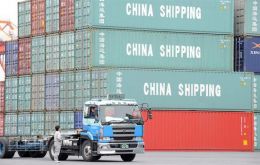
China's trade surplus fell to its lowest in nine months in January after imports surged, supporting the government's case ahead of a G20 meeting that it is doing enough to spur domestic demand without speeding up currency appreciation.
-
Tuesday, February 8th 2011 - 14:29 UTC
China’s New Year takes off with higher interest rates, third time since October
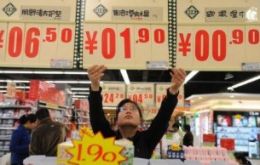
China's central bank said Tuesday it will increase key lending and deposit rates by a quarter percentage point, effective Wednesday. This is the third People’s Bank of China rise since last October, a move aimed at combating stubbornly high inflation.
-
Monday, February 7th 2011 - 20:54 UTC
Geithner implicitly endorses “capital controls” during Brazilian visit
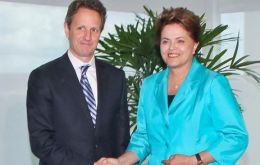
US Treasury Secretary Timothy Geithner reached out to Brazil by citing a shared concern - China - and endorsing Brazil's approach for dealing with global economic distortions.
-
Sunday, February 6th 2011 - 21:02 UTC
Geithner visits Brazil to discuss economic and financial cooperation
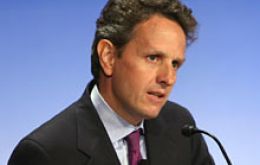
United States Treasury Secretary Tim Geithner will visit Monday Brazil to discuss economic cooperation. Geithner is scheduled to return on the same day.
-
Friday, February 4th 2011 - 21:21 UTC
Rousseff and Obama to discuss ways to counteract China’s undervalued Yuan
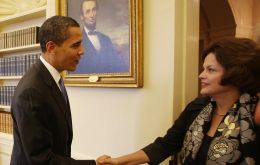
Brazilian President Dilma Rousseff will discuss with her U.S. counterpart Barack Obama ways to counteract the threat posed by an undervalued Yuan and cheap imports from China, a Brazilian official said.
-
Wednesday, November 10th 2010 - 05:33 UTC
Contrary to expectations China’s October trade surplus soars to 27.2 billion

As world leaders prepare to debate international trade imbalances this week, China announced Wednesday that its trade surplus surged last month to a staggering 27.2 billion US dollars, a 61% increase over the 16.9 billion surplus in September.
-
Wednesday, November 10th 2010 - 05:28 UTC
China resists becoming the locomotive for the world economy, says IMF

China is resisting pressure to become a locomotive to pull the floundering US economy out of its hole, notably by stubbornly pegging its Yuan to the dollar, a senior IMF official said on Tuesday.
-
Wednesday, October 20th 2010 - 01:04 UTC
In a surprise move China raises interest rate for the first time since 2007

China has raised interest rates for the first time since 2007, as it tries to rein in inflation and dampen its red-hot real estate market. The People's Bank of China said it will raise its one-year lending rate to 5.6% from 5.31% and its one-year deposit rate to 2.5% from 2.25%.
-
Wednesday, October 20th 2010 - 01:02 UTC
Geithner vows not to devalue the dollar for export advantage
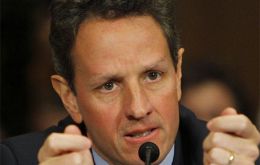
Treasury Secretary Timothy Geithner vowed that the United States would not devalue the dollar for export advantage, saying no country could weaken its currency to gain economic health.
